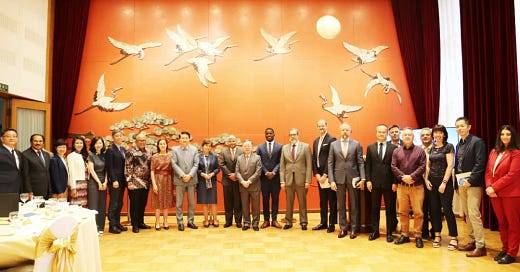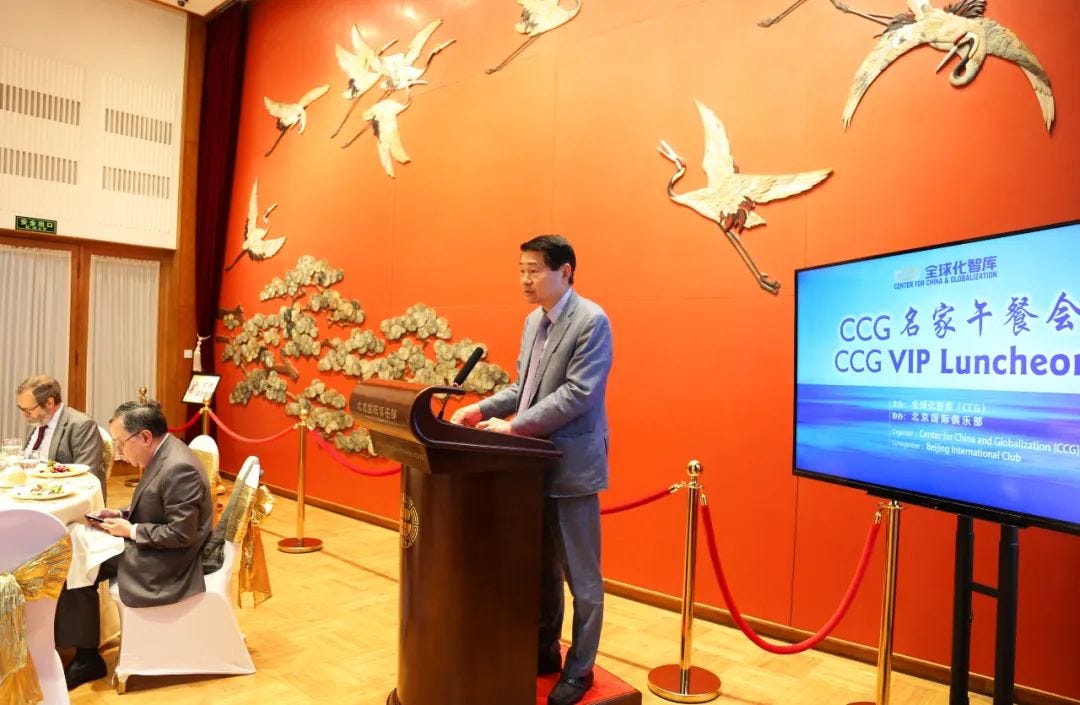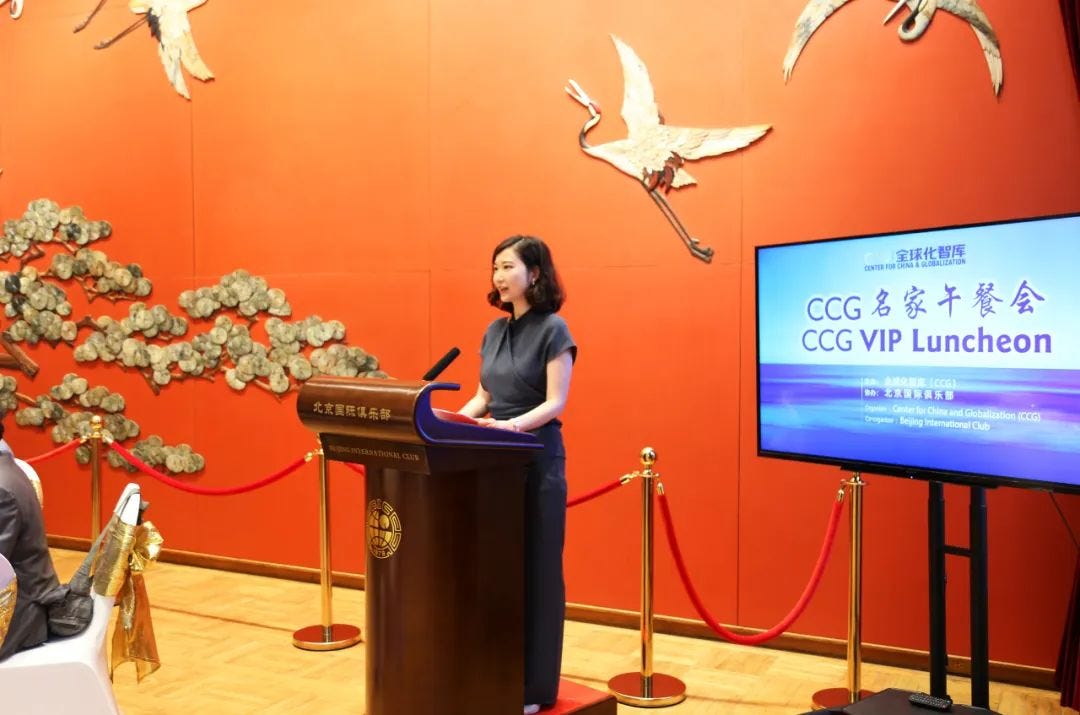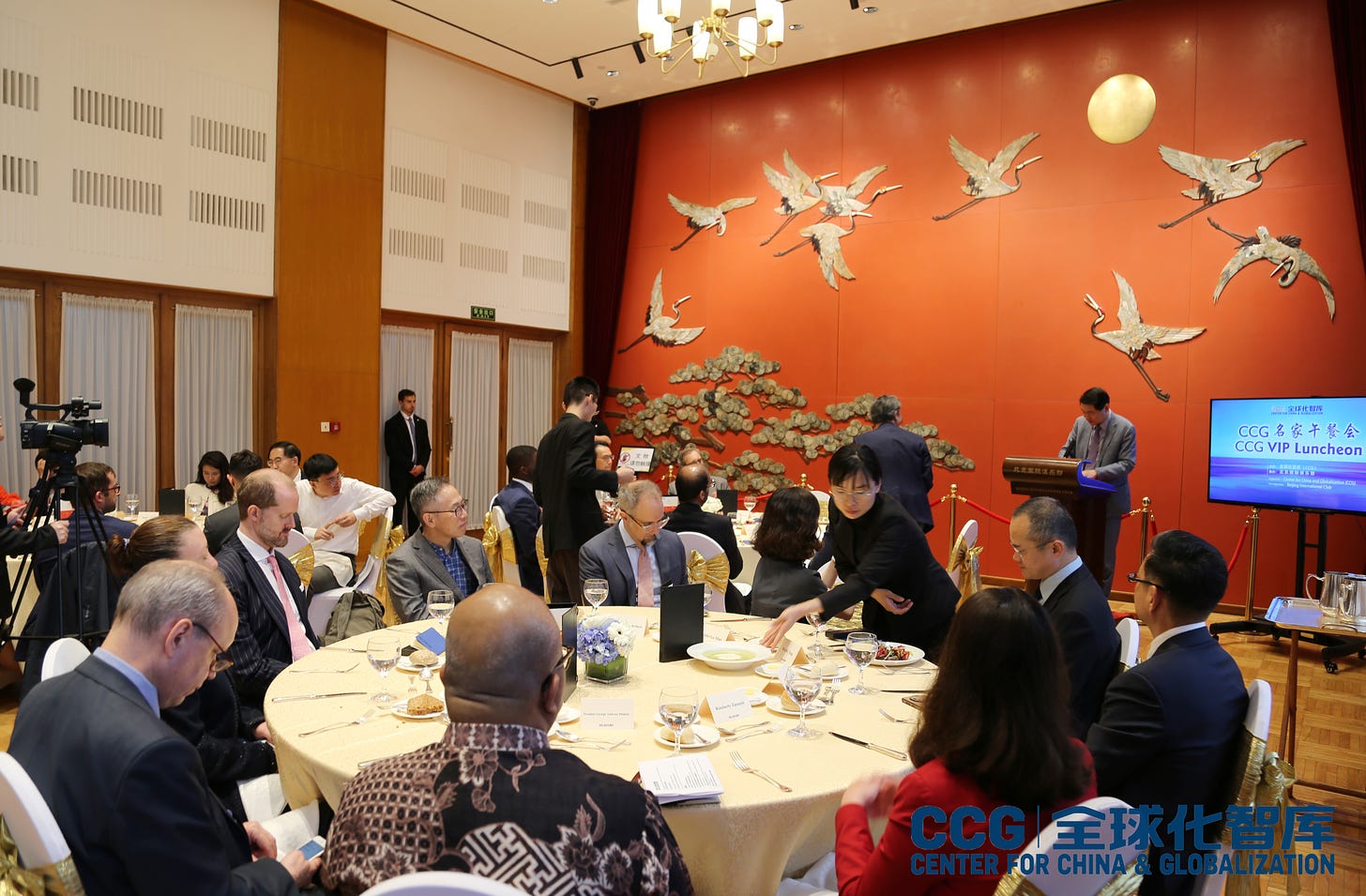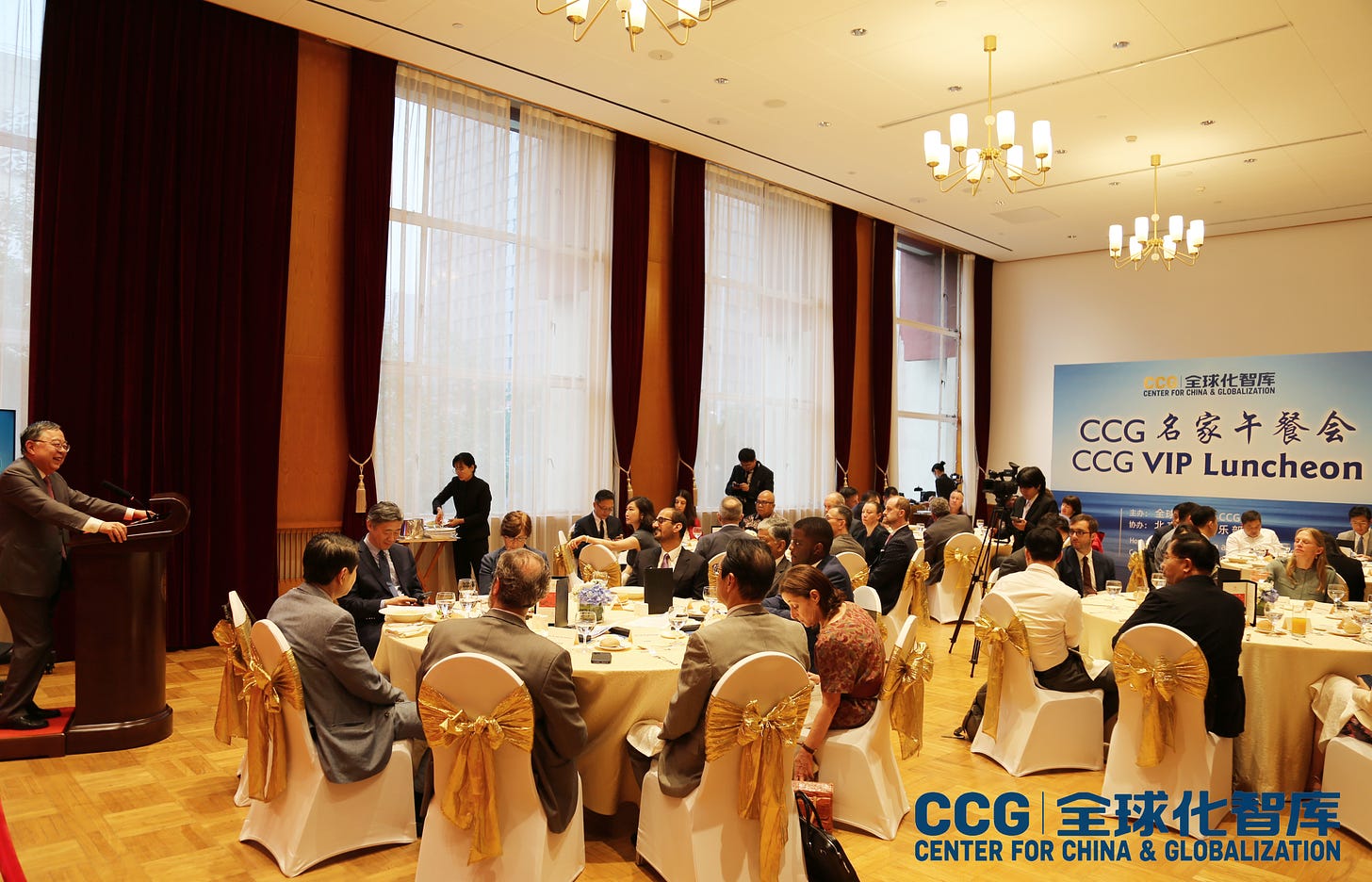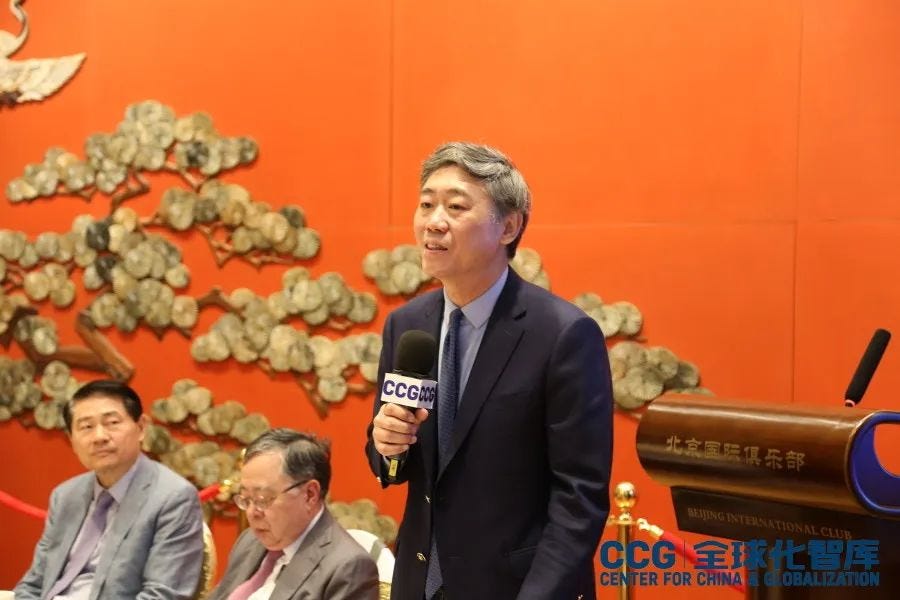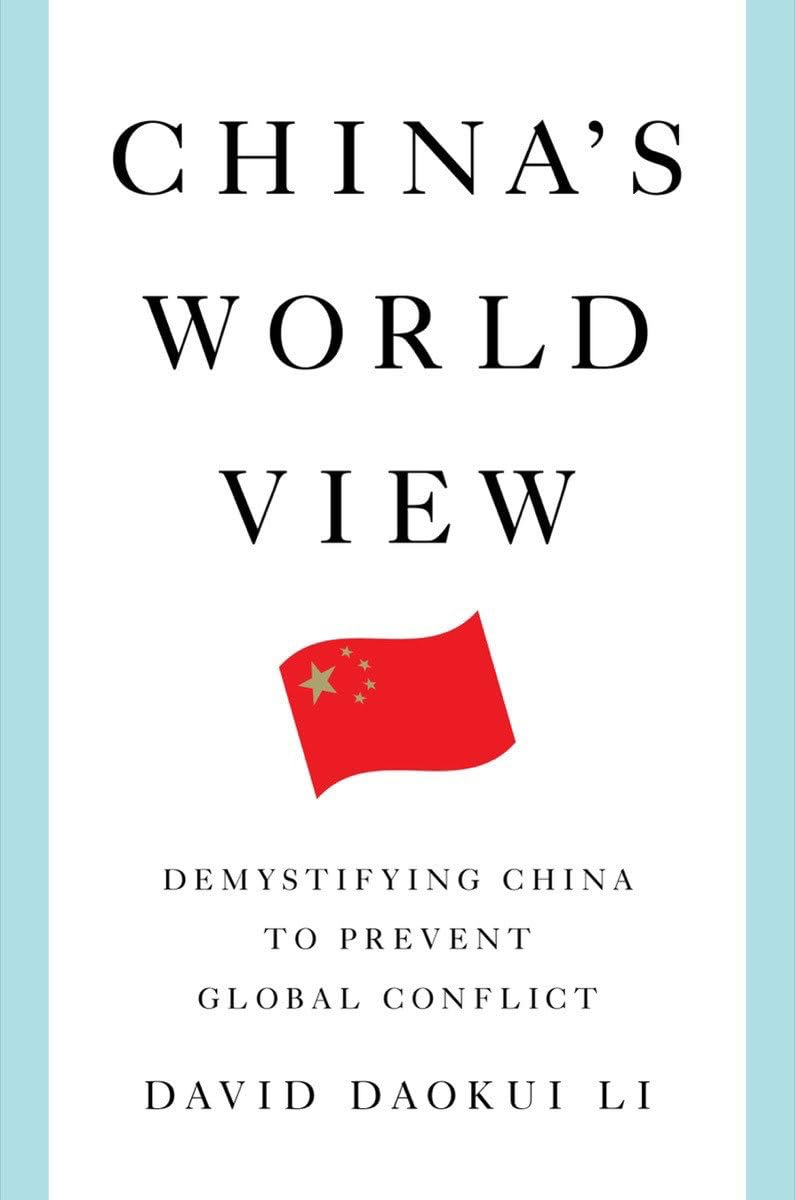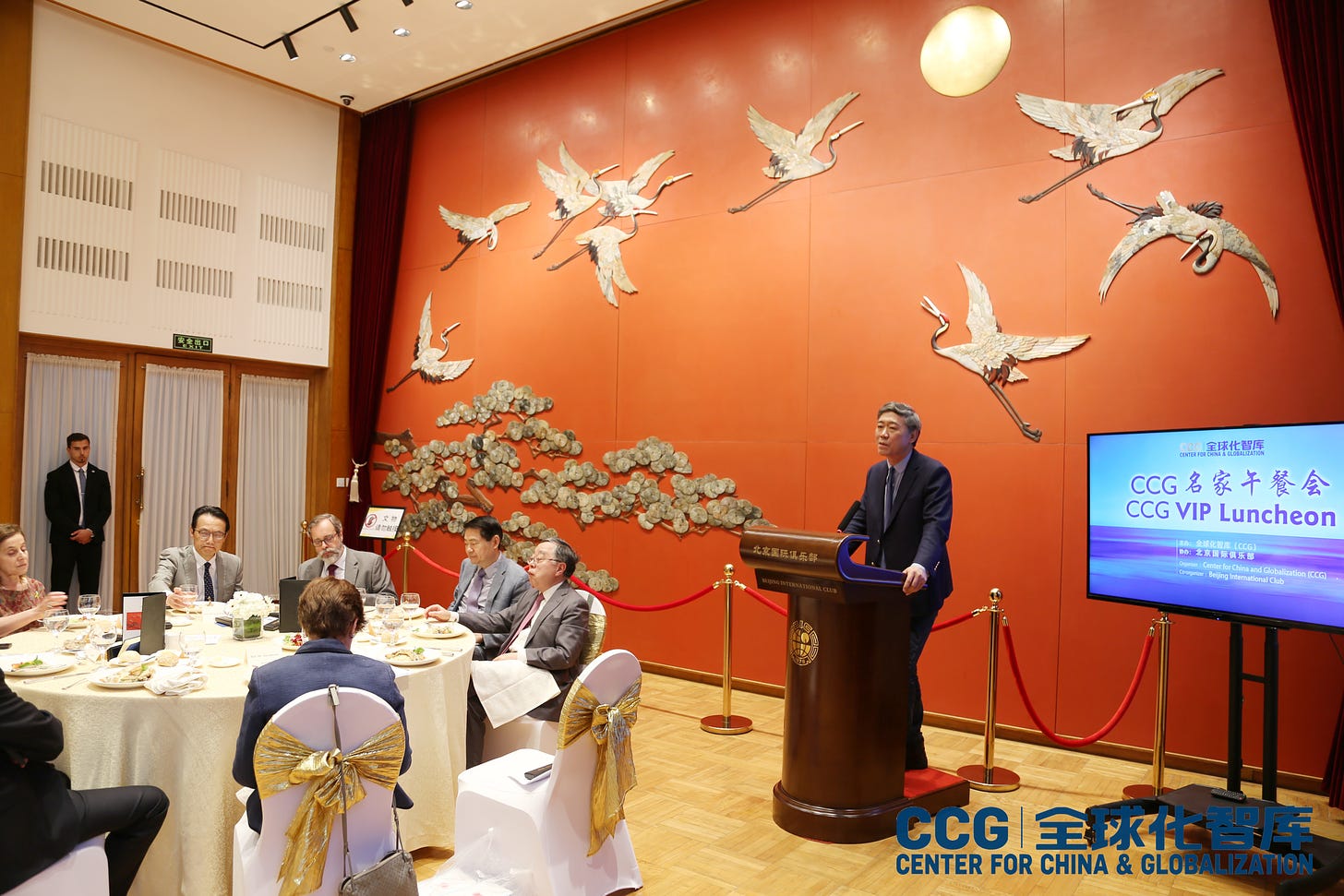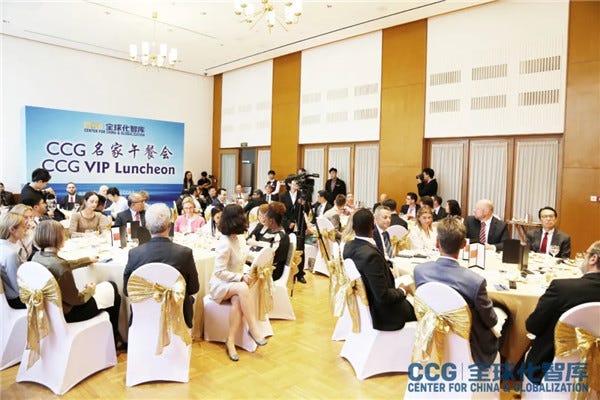Transcript: Ronnie Chan and David Daokui Li at CCG VIP Luncheon
The Hong Kong real estate tycoon shares his pessimism on world affairs and the mainland economist talks up optimism on China's economy and the upcoming Third Plenary Session in July.
The Center for China and Globalization (CCG), supported by the Beijing International Club, held a second CCG VIP Luncheon last Friday, June 7. The luncheon was held in the historic Xianhe Hall of the club and featured Ronnie Chan, Honorary Chair of Hang Lung Group, Chair Emeritus of Asia Society and the Chairman of its Hong Kong Center, and David Daokui Li, the Mansfield Freeman Chair Professor of the Department of Finance of the School of Economics and Management of Tsinghua University and also the director of the Academic Center for Chinese Economic Practice and Thinking ACCEPT.
CCG has broadcast the video recording of the event on Chinese online platforms where it remains available. It can also be accessed on YouTube.
Guests at the luncheon include ambassadors of Ireland, Israel, Japan, Portugal, India, the UAE, and Barbados, the charge d'affaires of the European Union delegation, the deputy head of mission of the Indonesian embassy, and other diplomats from Croatia, New Zealand, Malta, Canada, France, Norway, and Argentina.
Journalists from CNN, BBC, Reuters, AFP, The Economist, South China Morning Post, and Delo also attended, in addition to representatives from international organizations and businesses in Beijing.
Wang Xing, founder and CEO of Meituan, China's biggest delivery platform, also joined.
Below is a transcript of the first part of the event, namely the speeches of Ronnie Chan and David Daokui Li, based on the video recording. They haven’t reviewed the transcript, which may contain errors.
Their Q&A will be published later.
Ronnie Chan
Honorary Chair, Hang Lung Group; Chair Emeritus of Asia Society and the Chairman of its Hong Kong Center
Standing between you and lunch is really not a good idea. Anyway, thank you, Henry and Mabel, for inviting me to be here. I thought that perhaps I would frame my talk this way because Henry said I can say anything I want. I decided to call it "one man's view of a brave new world".
I think it is probably fair to say that I'm the oldest person in this room. I'm 74. I've been around and I've never seen the world as troubled as that is today—probably since WWII, and that was before my birth. My father's generation went to hell because of all the trouble in China, as well as with its neighbors. Whereas my generation is the luckiest, we saw nothing in terms of serious trouble. So when we enter into this new phase, it's really the time for us to stop and rethink where the world is going.
Allow me to just share two incidents. One is not that important historically but turned out to be very significant. The other is obviously very significant and that is—allow me to just say a word about it - the Ukraine War. And then number two, the U.S.-China relations. I'm not going to get into all the details because you know it more than I do, but I just want to tell you from this one Asian's perspective: how do I see a world that is being shaped, as we speak by these two events?
Let me begin by telling a story. In 2015, I was invited by a shareholder of mine, who's a Russian gentleman living in Shanghai, to speak in Saint Petersburg. Many of you know that's Putin's hometown, and he has this big event there every year attended by 9,500 people. I was asked to speak on Asia, the only session about Asia. At the last minute, I found out somebody I knew very well, that is, Kevin Rudd, who was to be sharing the podium with me. I hired Kevin into Asian Society when I was the Global Chair of Asia Society. I invited him to join our Asia Society as the head of a think tank.
So I said, wonderful. I'm nobody. Nobody knows who I am. Most of you probably never heard my name until Henry invited us to the luncheon here, but everybody knows Kevin Rudd, right? So I feel very good. More people will come. Now, a 9,500-people event. How many people showed up in the only session on Asia with one speaker of which is Kevin Rudd? How many showed up? Anybody? 27 people. Now, Kevin Rudd is somebody. Asia is important. And that 27 out of 9,500 people showed up. If the same event were to be happening today, I would imagine that a lot more would be there. That means by 2015, Russia was uninterested in Asia.
After that session, the organizer came to me and said, "Mr. Chan, President Putin wants to invite you to this paneling section to share the podium with him." Why? He wants all business people and I represented Asia. Why? Because they don't have anybody from Asia. So last minute, they found an Asian. The only reason I was on stage was because I am Asian, I know Asia. Anyway, when it was my turn to speak, I asked Putin, "Mr. President, how come only 27 people showed up? I'm sure you're all scientists, strategic thinking, all that stuff, but, is your business community, are your citizens prepared for the rise of Asia?" Don't forget in the last 20 or 30 years, 32.7% of the global economic growth every year came from China alone, not to mention Japan, Korea, Singapore, Indonesia, and many other countries. So it is truly amazing that Asia was not in their calculations at that time.
Look at what happened today. With the Ukraine War, with the Nord Stream 2 the way it is, they can no longer sell, at least not directly to Europe but go to India or wherever—I don't know, I believe you know that better than I do—they have to sell to China. For 319 years, since 1697 when Peter the Great went to Western Europe, building Saint Petersburg and moving the capital there in 1703, until 2022, Russia has been looking west to become part of the West. And finally, after 319 years, the West says, "You're not one of us, go home." And what happened? A gas deal that could not have been signed between Russia and China that was there for over a decade, suddenly within weeks, in almost a month, was signed. Of course, the same thing happened in 2014 when the Crimean War started. Think about it. When Russia, this big country, which I would say had zero interest (in Asia) in 2015, judging from my personal experience, now has no choice but to look to the East. Think about the ramifications that has on the whole wide world.
The Ukraine war in itself is nothing. Regional war, history is full of it. Even today in the world, there are still regional wars here and there. Yet this one is different because it changed the entire international energy infrastructure. Like it or not, the world is a changed place.
I know there's a lot of European friends here. I can understand their psychological trauma. War, finally returning back to Europe, was almost impossible for them. Some of them even said, "Listen, with the EU, war is no longer possible." And it was only two or three years ago that you heard such things. I always find it incredibly naive, as if human nature has changed, that it is impossible for Europe to have a war again. They're still telling me that, "With the EU, there will be no war." I said, "Do you want a bet? I will buy you a lunch like this." My friends today in Europe are still in this dream world. I'm sorry, Ann [Derwin, Irish Ambassador to China] you're from Europe. I hope I'm not offending people too much. But if I am, it will be my last time here in the CCG. I'll be gone after this. [laughter from audiences]
So the whole World has changed. Another thing is—sorry, the Ambassador from Israel is here—Egypt and Israel discovered a lot of gas. As you all know, I was in the Middle East seven times last year, I was in UAE just a few months ago. Egypt and Israel have a lot of energy. I don't know, but Israel, for at least 100 years, has no problem with energy and can export it. My question is when Europe can no longer buy from Russia, who are the two new sources of energy? One is the United States, of course, but that's four times more expensive than what they used to pay. That's why Germany is in serious economic difficulty today. The other source, I submit to you, will be from the Eastern Mediterranean Basin—that will be Egypt and Israel. Is that good? Well, short-term speaking, it will be good. Long-term speaking, I'm not sure.
I've been to Egypt twice last year. The last time I was there, a former foreign minister said to me that they stopped pumping natural gas. I didn't ask why. This is a sensitive subject. Maybe it's because—the Ambassador of Egypt is not here, right? Okay—I don't know. Maybe mismanagement? So they are refining mostly Israeli natural gas, and as we all know, as we talk, a pipeline is being discussed. You can imagine the world is no longer a new place after the Ukraine War. My question is this—since the Russian Ambassador is not here—will Russia do nothing when they see that in the old days, they got all the economic benefit from shipping natural gas to Western Europe? Of course, they're not the only ones but they are paid much in the process. Will they watch other countries eat their lunch, so to speak? That's one side.
The other side is four ministerial-level people from four countries from the Middle East publically said that America is no longer a primary player in that part of the world; it's no longer the dominant player in that part of the world. You can deny it, but I heard it with my own ears, four ministerial people from Saudi Arabia, UAE, Israel, and Egypt. I don't think that they will relinquish that region altogether. But that said, given the size of America, their movement, one way or another, would tip the balance of a lot of things. I even have this opinion—My European friends may not like it. That's why I say this is one man's view—I believe that America is on the way out of Europe as well, inevitably, for what has happened over the last 40 or 50 years. Like it or not, this is a brave new world that we have never seen before.
Let me turn now to the China-U.S. relations. Today, there is a lot of talk about Thucydides's trap. People agree with it, people don't agree with it, doesn't matter. I said, forget about the term. My friend Graham Allison is just smart enough to give a name that sounds very good and sells the book very well. The reality is, whether you like it or not, it's nothing more than human nature.
And people say, "I don't believe in Thucydides' Trap." I say, “When did you stop believing in human nature?” Human nature didn't change. It's been like that for the last billions of years. What makes you think that human nature has changed? For the No.1 to try to contain the No.2 is a natural instinct of (humankind). I thought for a long time that perhaps the United States would be enlightened enough not to fall into that trap. But over the last 10 or 20 years, we all know what happened. That, too, will change everything.
For example, deglobalization is inevitable. Like it or not, it's already happening. You can deny it as diplomats—diplomats are very good and sorry, you know what I mean. Deglobalization is a thing that is real. Imagine the inflationary impact of that. You have to rebuild a second supply chain, for example. Can you do it? Frankly, I don't think so. And even if you do succeed, it would take 15 to 20 years for you to rebuild everything, to duplicate that infrastructure—cement, steel, whatever. The inflationary pressure of that is gonna be tremendous.
Two weeks ago, I hosted a dinner for Jamie Dimon. Many of you know him, the JP Morgan Chairman. I hosted a dinner for him in Hong Kong with people at the Asia Society. It is very clear that he talked about all kinds of risks. As a banker, he is one of the very best in risk containment and management. But if you were to listen to his speech carefully, and it's on record, you will hear his two main concerns. And none of those things that he talked about, which as a banker he has talked (about).
His true main concerns: number one is geopolitics, similar to what I'm talking about right now. Number two is inflation. Like it or not, who is the biggest loser of an inflationary environment? Well, whoever has the most debt, and we all know that. So the challenges that both China and the United States will face are tremendous. You all live in Beijing. I don't live in Mainland China. I live in Hong Kong. So you know China more than I do.
Suffice it to say that the several big economic challenges are real. For the last 8 or 9 years, I've been speaking on the keynote of the biggest real estate conference in China, held in August in Hainan. While there, I've been warning everybody that the residential real estate model in place at the time is not sustainable. The fact that the government would not allow the little bubbles, a company that goes bust, to go bust, creates a tremendous moral hazard. Eventually, one small bubble, a second, a third, a fourth, and eventually became a big one that just imploded on its own weight.
I don't think that China is without capability to handle it, but it's going to be very serious, not just as a financial exercise, but as a policy exercise. In the old days, all the local governments sell land. My developers—not me, I never bought land like that—all the developers in the mainland buy land at high prices and eventually overbuild to the hilt. From now on, nobody is going to buy land, and certainly not at high prices. And we all know the supply-demand situation; it's popular and commonly known.
So how will the local government get the money? They have to have some policy changes that will be installed. I think that it will also change a lot of things in the world. A lot of people talk about the internet companies. Why are they the way they are? I said I fully agree with what the Beijing government did to deal with the internet company. In fact, five years ago, I called one of the biggest Internet platform companies in this country, one of the four original founders, and still involved. I said, "Have you ever thought of voluntarily breaking up your own company? Because every responsible government will have antitrust law and antitrust practices. Remember the Standard Oil of California, Standard Oil of Ohio, Ma Bell, AT&T? All those companies and institutions were dismantled because of antitrust reasons. One of these days, you guys are absolutely anti-competition." Any other new companies cannot grow because a few of you just buy them up.
Wang Xing was supposed to be here. He is a friend of mine. He is the Chairman and Founder of Meituan. He is one of those. Since he is not here, I can talk about it. [Wang Xing showed up late to the lunch.]
Anyway, it's not that you can't see it coming. A guy like me looking from the outside in Hong Kong, I've watched the situation and said, "Antitrust law and antitrust practices, absolutely will come." He called me back a week later and said, "We thought about it, we discussed it, we decided not to do anything." Okay. You own the company, we respect property rights. You live with your decision and we all know what happened.
So it's not like something that people cannot foresee. Many of us foresaw that all those internet platform companies would have to undergo changes because they were already anticompetition. Of course, they also spent so much money during the third year of COVID-19—but don't forget, in the first two years, China did it right— great time economically, it's just that the last year was a little bit problematic. So for all those reasons, China is facing a lot of challenges as we all know.
But let me also mention a few challenges that the United States is facing, and I will end. The United States has its own challenges as well. I'll give you five.
Number one, America is a country at war with itself. Politically, it's locked up that it cannot move. I have seen the deterioration of the political process in America. I have lived there since 1967 for about 16 years. I saw it deteriorating over that period of time, no longer possible to compromise and negotiate these things. So you have the political problem, and then you have the race problem. And in America, you have a unique thing, that is issue-based divides, from gender to guns, to narcotics, to immigration, and to many others.
So America is really a country at war with itself. If Trump were to win, which all my U.S. friends tell me to be possible and very likely, actually, imagine what that would do. And I say, if Trump wins, three things for sure will happen.
The internal splintering of the country will continue faster.
America will lose the respect it commands after WWII faster.
The deglobalization process that America initiated will cause a fracturing of the entire world because you're forced to choose sides. When I tell you to choose sides, you don't have to listen to me; I'm nobody. If America tells you to choose sides, you have very few choices.
That's point number one.
Point number two, financial crisis. I have been working with the finance industry for the last 50 years. I just don't see how a financial crisis does not come within the next few years. It always does and it would.
Number three, nobody can damage the supremacy of the U.S. dollar. Only one country can. Which country is that? America itself. America, for the last 20 or 30 years, has been doing double time to damage the supremacy of the U.S. dollar by itself. You lock up everybody's assets, you give it to your enemy, you do not allow them to trade through the SWIFT, and so on and so forth. Eventually, not only are your enemies watching, your allies are watching. Your allies are saying, "Hey, today they can do this to that country. What about tomorrow if it happens to me?" So when the Singaporeans began to buy gold one or two years ago en masse, an Indian friend said, "This is the beginning of the de-dollarization of Singapore."
Now Singapore is small, you may say they're not important, but they're well-governed and they're very important. When Singapore begins to do that, a lot of other people are watching. Of course, they are not the first one and not the only one. A lot of other countries are already doing that: Russia being one of the earliest ones and China as well.
So I think that the U.S. dollar is under tremendous pressure. I never accept the fact that people say, "It will not take you as an alternative." Ladies and gentlemen, Beijing is full of high-rises. If all the buildings are on fire except mine and the U.S. dollar. Mine is not burning. Everybody else is burning. No alternative. You are on the 80th floor and somebody on the 50th floor calls and says, "Sir, the fire is on the 50th floor." Five minutes later, he called and said, "Sir, the fire is on the 60th floor. " I'm not gonna go. There's no alternative. Every other building is burning. Would you not go down? The first thing you do is to go down and worry about the rest of the levels. So I never accept that truism that people assume to be the case. They are not true. That worries me tremendously.
Number four, there may be some diplomatic and military mishaps on the part of the United States that will leave the U.S. dollar naked. If the confidence of the military-protective network is being questioned by the rest of the world, then the U.S. dollar will be left naked. That is the nuclear bomb that the world, not just the United States, will face.
Finally, Number five. Allow me to be a little bit nasty, which I always am anyway. I grew up under the British colonial days. If you were to tell a Chinese, you are hypocritical. The Chinese would say, "I am not." If you tell an American you're hypocritical, the American would say, "Not only am I not hypocritical, I am the incarnation of righteousness. Don't you know?" And if you were to tell Brits—I hope there are no British friends here. They are awesome, again. If you tell a Brit that "You are hypocritical", What will he say? He will have a small grin and say nothing. His grin means "I heard you." At the end of the day, who is the most self-aware and the most honest is the Brits.
But if you put yourself on a pedestal, that "I am the incarnation of righteousness," and then fast proof that you are just like the rest of the world. Everybody is hypocritical and you say you are not, but you are perhaps worse in many way. There may be a very strong reaction—a social psychological shock in the American system that may well bring it back to my last point: that will well bring America into isolationism. Don't forget, America was never founded on internationalism. It was founded on isolationism. From 1823, the Monroe Doctrine; exceptionalism beginning in the 19th century, continuing until today; never joined the League of Nations in the 1920s; the trade embargo that caused the Great Depression of 1929.
So all those things are serious matters that are affecting the U.S. and should then affect the world. How will that end? There's no winner in the China-U.S. context…[inaudible] but that can be an illusion. But it doesn't have to have an illusion. Let me explain.
Both sides cannot win, but both sides can lose. By not losing, you wait for the other guy to lose, and that is the sad game that we are playing. My personal assessment is that it is not how many punches you throw; it is how many punches you can accept. And I suspect that in China they can accept it perhaps better.
I grew up in the Vietnam War era. Those were the days when all my classmates were anti-war marchers. The American system does not allow it to engage in a long-term context. That's why, even in the Olympics coming next month, America wins all the 100-meter until recently, and a lot of the short sprints, but they never win a long-distance race. So I think that, like it or not, the world is such a troubled place. I'm so glad that I live in Hong Kong. I think it's still one of the best places to live. If you read the Western newspapers about Hong Kong, I say to you, hey, let's differentiate between political talk and economic reality.
All of you guys are experts in political talk. I'm a business guy, and I'm more concerned about the economic reality. So I think I'm happy living in Hong Kong. I travel the world all the time, visiting in the United States every month. I traveled around the world three times last month. So it's nothing new to me. I think the world is in a considerably challenged position, and we'd better be ready for catastrophic changes that will happen, I believe, starting from now until the next 10 years. It will be a decade that is the most consequential in the world. And let's hope that we'll be able to get through these 10 years. All of us still as friends and live in peace. If we can live through 10 years of that. I will buy you lunch again. But I think that the chances are good that if you take my bet, you will be buying me lunch. Whatever it is, thank you, Henry, for the lunch.
David Daokui Li
Mansfield Freeman Chair Professor, Department of Finance, School of Economics and Management, Tsinghua University; Director, Academic Center for Chinese Economic Practice and Thinking (ACCEPT)
Thank you very much, Henry, not only for your very generous introduction but also for your invitation. Whenever I have any opportunity to stay in the same room as Ronnie Chan, I always would join. Actually, two days ago, we were together. However, I was trying to get an airplane so I didn't get enough view. So truly, excellencies, ladies and gentlemen, today is very special.
Ronnie just shared with us his really globalist views of the world. He calls himself a businessperson. Actually, I think he is the only businessperson who can be called GPPE. I came up with this acronym. What is GPPE? Global, political, philosophical, and economic, right? It covers everything. In universities, we have PPE as a major. Now, I think Ronnie reminds me of a GPPE. One of them here, Wang Xin, our schoolmate from Tsinghua University, wants to see you.
Ronnie has already covered lots of ground also with deep insights. So let me be very narrow. Let me only talk about the Chinese economy with three super simple messages. I hope you can remember the three simple messages.
The first message is that the economy is running below its GDP growth potential. The economy is not growing as well as we economists would like. So we are growing below the potential, meaning that not only are the GDP growth rates below 5.7-5.8%, which is the norm for these two episodes of Chinese economic development, but also we have inflation, we have inflationary questions. In fact, the PPI has been negative for 10 to 15 quarters, and the CPI has been centering around 0. So on this side indeed, the economy is running below its GDP potential. That's a very simple point. I think we academics and economists, should definitely recognize this.
The second point that I want to mention is that people are very much aware of the problems causing the GDP to run below its potential. The problems are fully fought; the symptoms are highly recognized by policymakers, top leaders, and academics. There are three very explicit problems and they are the following.
1. Property market.
The property market is facing, I would call, mainly a liquidity problem. It's not necessarily a long-term or systemic problem because, in the long run, there still will be more demand for housing. Remember that only 50% of the population have been fully assimilated into urban lives. There are 50% of the population who are either living in the countryside and looking to move to cities one way or the other, or who have already been living in cities and meanwhile, they're not allowed to buy a piece of property or bring their kids to live with them in cities. This we call migrant workers.
They earn a pretty good salary. This morning, I experienced the life of 美团小哥 [food-delivery driver for the online service platform Meituan]. I rode my electric motorcycle here. I had my rain jacket. So I rode together with them. Experience with me, okay? I'm running late, I'm racing with -- I'm not racing with, I'm running with your [Wang Xing, founder and CEO of Meituan] half a million, I guess, employees. 美团小哥, they are just starters in Beijing. I think they are earning something close to 10,000 RMB, right? If they're working hard enough, at least 7,000-8,000, right? After-tax net income of 7,000 a month. Pretty good salary. Of course, they work very hard. We appreciate them and always give them extra 打赏 [tips]. So property market issue is liquidity and the problem is partially aggregated by the current policy. The current policies make sure property developers are able to finish their projects in cities, so local governments are holding on to the presale down payment, leaving the headquarters of developers running for cash and borrowing a lot of money. And now they are in a liquidity trap. This is causing defaults in Hong Kong and in some cases, the Chinese Mainland. This is causing the RMB to face pressure in the exchange rate. This is causing a downgrading of China's sovereign credit rating. So that's the number one problem.
2. Local public debt.
The second problem is even more important. It is the local public debt. How large is low public debt? My research team has been working very hard. We're doing our grassroots estimates of the level of local debt. Roughly speaking, it is 100% of GDP.
How high is 100% GDP? Local governments cannot simply service the interest payment of their debt. The question is why we came to this and whether it has a good effect. When putting myself in a historical perspective, I would argue in general, or in principle, these local public debts actually exist for wonderful reasons. These public debts were issued not for cash subsidies to households. Instead, the majority, or 80% of them were used to finance local infrastructure for the past 15 years since the Global Financial Crisis.
Looking back, I think China did the right thing because for the past 15 years, labor cost has been low, land overall has been not as expensive as today, and private housing has not been fully developed. That's the best time to build up infrastructure. If you go to cities like Chongqing, Tianjin, Zhengzhou, whatever city, they have brand new centers. This is the right decision to build up your infrastructure when labor cost was low, when land price was low, when private housing is not there yet; to do it beforehand. But in China, the central government was not willing to come up with key funds to finance infrastructure and let global governments do it. The issue now is that these infrastructure investments will stay there for 30 to 100 years. Why push me and my fellow citizens to pay? My kids have to pay, my grandsons have to pay. So why not extend the payment of infrastructure debt to 20 years, 30 years, 50 years, and even 100 years? Why not? However, at this, our government has not been quick enough in converting the local debt into long-term debt. We are doing that in a particularly rather cautious way. This right now is causing pain to the Chinese economy because local governments are huge players in the marketing economy. They should be. They're buyers of a lot of public service. They are delaying their payment to a lot of companies. So I think this is the biggest problem of today's Chinese economy. The local debt has to be restructured.
3. Supply-consumption imbalance
The third issue is a long-term issue. That is, to be very frank, the Chinese economy is a supply-side economy or rather Chinese policies are always supply-side policies. When we talk to a very specific mayor or governor of a province, he or she will be very excited. Five minutes after meeting him/her, the person will list the local projects, oh, here, we are going to have a new project of solar panels; we have a new project of TV screen; we have a new project producing certain kinds of computer chips; we have certain projects to convert our land into a beautiful new city center. So they are excited. They're limited to investment projects.
But if you ask them, how about consumption? Are you relaxing your restrictions on motorcycles? What is that? They look puzzled. Are you planning to relax the restrictions on the purchasing of automobiles or to do something -- we'll think about it. All mayors and all officials are like producers, wanting other cities to buy the stuff that they produce. You consume, we produce [inaudible]. But this is causing a problem of China, China being super fast in turning 1 to 1 million when we may not be as quick as the U.S. in turning 0 to 1. You know what I'm not talking about--innovation 0 to 1, even though we are peak in turning 1 to 1 million.
These are the three problems causing pain to today's Chinese economy running around 5.3%, then it should be running around 5.7%-5.8%.
My last point, which I truly want you to take home is that policymakers are working hard and the policies are being put into place to deal with all these problems as we speak. A huge and super important central Party committee conference will come in July. I don't know which part of July, but we're in June, so not too far. I'm sure major policies and major policy directions will be announced.
People are very much aware of the problems. So what are the likely and tangible policies put in place to deal with all three problems? Well, let's talk about them one by one.
For the property market, the key is twofold.
1. Get rid of the restrictions on housing purchases.
Under the previous restrictions on housing purchase, you are not allowed to buy a piece of property in Beijing as a foreigner, or as a resident from other cities. These kinds of things were useful 12 years ago, in 2012 when the property market was super hot. I argued for that. I supported the policy of housing restrictions. I was blamed and even hated by my fellow economists.
But today's situation is totally different. China is getting rid of housing purchasing restrictions city by city, Hangzhou, Xi'an. In Shenzhen, I think the large apartments are now free to trade. This is number one: to lift restrictions on housing demand. As I said, still, 50% of the population will have to buy a new piece of property to live in cities.
2. Provide direct financial support for the headquarters of developers
The other policy which I'm confident will be put in place -- actually already now -- and more in the coming, is to provide direct financial support for the headquarters of developers. Some of the developers themselves that may be perceived to be criminals -- I have no opinion on this -- may have done very bad things. However, don't punish us by not providing liquidity to the developers so that the company will default and therefore, the credit rating will come down. Provide necessary liquidity to the headquarters of developers to make sure they can stay and be restructured later on. Don't let these companies gain new troubles for the Chinese economy. So that's the first area of tangible policies I look for.
The second area of tangible policies is for restructuring local debt, which I take tremendous interest in. I'm working very hard on this. I've been arguing this for the past 10 years. There is no other way to deal with this. The only way to deal with this and a very good, desirable way to deal with local debt issues is for the central government to issue a tremendous amount of new sovereign debt as high as 30%-50% of GDP and use that to restructure the local debt, meaning swap out local debt. Why is the only one? Because the central government is the solventist. I argue without any question. Chinese central government is the richest central government in the world with shares of 3 mobile operators and 6 highly profitable central government-owned commercial banks. China Merchants Group, China Resources, Ltd., used to be, I think still is, the world's most profitable nonfinancial conglomerate.
Why not? The central government is only holding 20% of public debt. What are they doing? And you know the recent (statistics), 12% of the Chinese Ministry of Finance debt that is held by other central banks. It's almost the last point of Ronnie's. The Chinese central government debt is in high demand, not enough of it because central banks want to hedge. What if the US Treasury bond is not doing as well as the hedging, right? We're not doing that. That's the only way to do it. Once we do that, once the Chinese economy can do that, local governments will be freed. Local governments will come back to their vitality. They should have. I think the direction is already articulated, but the pace is too slow. I'm working hard. I'm working hard inside China to push for this.
The third area of reform I very much look for is determining the incentives of local governments from production to consumption, possibly by leaving some of the tax collected from local enterprises to regions and cities where cars, motorcycles, bicycles, and electronic products are sold. If your region is able to generate a smooth consumption, fine, the VAT and the tax associated with the consumption should go to you. We should change the incentive. I think this is coming now.
My final word. Why is this? What's my evidence? Why am I so confident? Well, a couple of weeks ago, President Xi Jinping held a very important, and I think, quite interesting session with ten entrepreneurs and economists. I was not there. I can talk freely. I have no national secrets in my mind. At the end of the seminar, President Xi said several things. Two things stay in my mind. He said, now let's rejuvenate our [economy] before by focusing on the most urgent and burning issues. Let's work on the problem now. Not just rhetorics. Let's talk about real solutions. The other point is that let's restart our reform by making sure citizens can see the benefit.
So what are the things the seminar was looking for? Consumption and also income. So I strongly believe the next round of reforms is coming and these reforms will not only solve urgent issues that are preventing the Chinese economy from reaching its potential but also generate consumption and generate disposable income for people on the street. Thank you very much.
Finally, I spent five years writing a book about China's World View published by W. W. Norton.
So if you want, first come, first serve, I put it here somewhere in the corner. Thank you very much.

